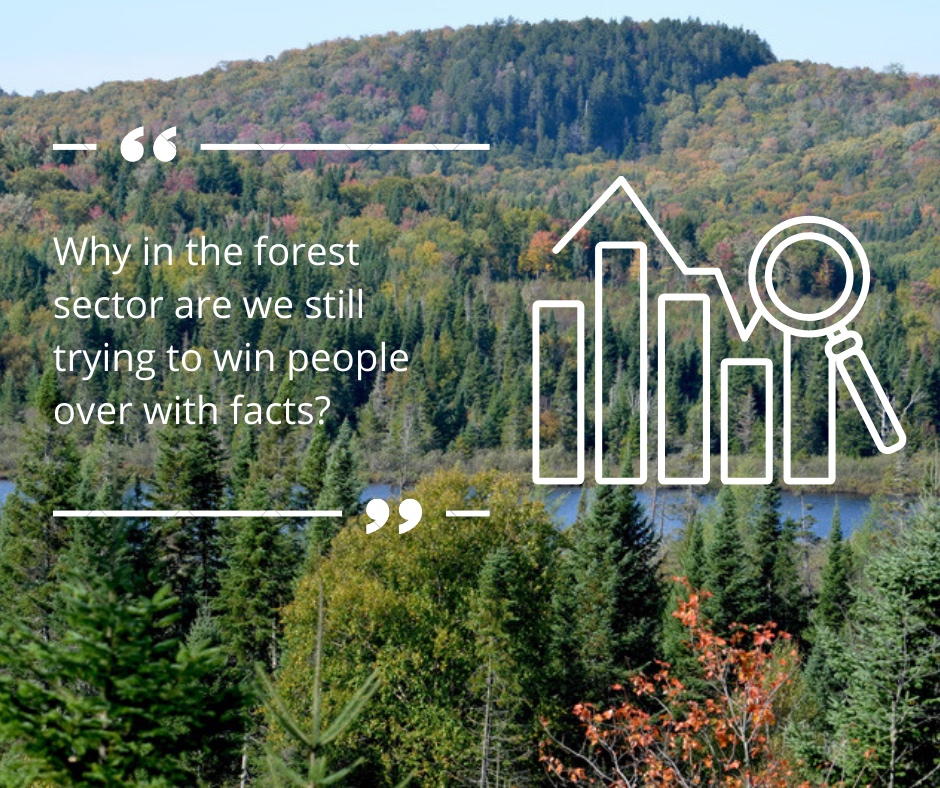
Features
Final cut: Forestry facts aren’t working – what now?
Why my science is better than your science … and why you’re still not convinced.
March 31, 2022 By Karen Brandt

In 2016, Oxford dictionaries chose “post-truth” as its word of the year. Defined as, “relating to or denoting circumstances in which objective facts are less influential in shaping public opinion than appeals to emotion and personal belief,” it begs the question: Why in the forest sector are we still trying to win people over with facts?
Don’t get me wrong, early in my career, facts were my friend. I loved to ask non-forestry people, “How much of B.C.’s forests do you think are actually logged each year?” And the answer usually made me chuckle. I’d hear anywhere between five and 20 per cent. I’m not sure what that says about my circle of friends.
You don’t need to drive far on Vancouver Island to see billboards with at least one perspective of the answer to that question (0.35 per cent) or to conversely read headlines of campaigning organizations “less than one per cent of B.C.’s old-growth remaining … defer all old-growth logging before it’s all gone forever!”
The fact is facts aren’t working (or necessarily helping) and here’s a few reasons why and what we can do about it.
We live in an increasingly polarized society. The rural-urban divide is getting wider, and the urban population is the side that’s growing. We also know that the echo-chamber effect is furthering this divide. Echo chambers are communities where people encounter beliefs or opinions that align with their existing ideas and values and alternative ideas are not even discussed.
The issue is exacerbated by social media. As a community gets larger, the more likely it is that a person can find more people who reinforce and share their beliefs. Many of these communities are growing as a result of filter bulbs and algorithms, used in social media and search engines, which deliberately deliver results that align with a person’s values and interests.
It’s also important to recognize that every one of us also has our own confirmation bias. This is the tendency to process information by looking for or interpreting information that is consistent with our own beliefs.
So, what can we do?
First, we need to accept that facts and values are interconnected. Dan Kahan, law professor at Yale Law School and member of the Cultural Cognition Project writes, “sometimes when we argue about the facts, we’re not arguing about the facts at all… these are more often disputes over values.”
Secondly, seek out common ground. In their research paper The Moral Roots of Environmental Attitudes, authors Robb Willers and Matthew Feinberg point to the moral foundation’s theory, which maintains that liberal-minded people value equality and protection of the vulnerable, while conservative views support in-group loyalty and moral purity. As a result, Willers asserts, “You’re essentially trying to convince someone who speaks French while speaking German to them.”
Thirdly, listen… and then listen some more. A 2016 study by the Journal of Science found it is possible to reduce prejudice and sway opinions on anti-transgender legislation with one 10-minute conversation. It worked because the canvassers did a simple thing – they listened. Psychologists call this “active processing.” The idea is that people learn lessons more durably when they come to their own conclusion.
Fourth, get uncomfortable. Recognize your echo chamber and listen to other views. Oxan Varol writes in The Next Big Idea Club, “When your beliefs are entwined with your identity, changing your mind means changing your identity. That’s a really hard sell.”
And lastly, fear doesn’t work. Research has proven that talking about the end of the world, climate disasters or even job losses will not sway opinion. A study by Tyndall Center for Climate Change Research found that “Fearful representations … may initially attract individuals’ attention. However, they can also act to distance and disempower individuals in terms of their sense of personal engagement with the issue.”
The fact is, getting people to understand your position or to work with you to find common ground is going to take some elbow grease. No expensive billboard or social media campaign alone is going to bring people together; in fact, it will have the opposite effect and keep your detractors and challengers more firmly rooted on the other side of the forest.
There is hope. Every day organizations are applying that elbow grease – like the Invasive Species Council of BC, Ducks Unlimited and the Sustainable Forestry Initiative, working with organizations that on the surface have little in common. The one thing they do have in common, however, is a willingness to exit the echo chamber and listen to the other side.

Karen Brandt is a communications professional who has a passion for sustainability and communities. For the past 30 years she has held a number of senior positions in the public and private sectors where she has built common positions and partnerships with First Nations, environmental groups, customers and governments. She holds an honours Bachelor of Journalism from Carleton University in Ottawa.
Print this page